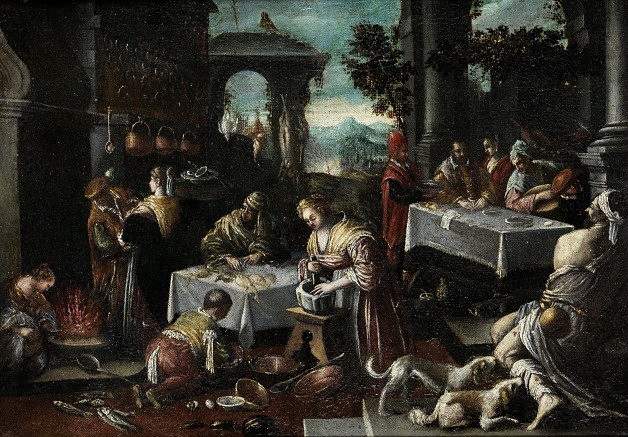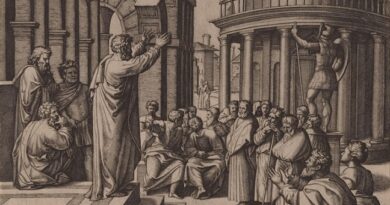The Unique Parables of Luke
Listen, O my people, to my instruction; incline your ears to the words of my mouth. I will open my mouth in a parable; I will utter dark sayings of old.—Psalm 78:1,2 (New American Standard Bible, Updated Edition)
It was prophesied that the Messiah would teach using parables, or illustrations, and this was fulfilled in the ministry of Jesus Christ (Matthew 13:35). Parables were an identifying characteristic of his teaching. But why parables? Without question they were a powerful teaching aid. People would easily remember and share them with others. The parables were also rich, spiritual metaphors. The deeper meanings would unfold as a disciple progressed in the Christian walk.
Parables also served another purpose. Jesus explained that, “To you it has been granted to know the mysteries of the kingdom of God, but to the rest it is in parables, so that seeing they may not see, and hearing they may not understand” (Luke 8:9,10). The parables acted as a spiritual filter. Those to whom the good news was directed would understand; others would not. How privileged we are then, to be counted worthy by our Lord to understand the divine teaching hidden in his parables.
In the book of Luke there are eleven parables that are not found in the other gospels[1]:
· Two Debtors (Luke 7:41-43)
· Good Samaritan (Luke 10:30-37)
· Importunate Friend (Luke 11:5-8)
· Rich Fool (Luke 12:16-21)
· Barren Fig-tree (Luke 13:6-9)
· Lost Piece of Silver (Luke 15:8-10)
· Lost Son (Luke 15:11-32)
· Unrighteous Manager (Luke 16:1-9)
· Rich Man and Lazarus (Luke 16:19-31)
· Unjust Judge (Luke 18:1-8)
· Pharisee and the Tax Collector (Luke 18:9-14)
These parables were spoken within a common historical context and share a common theme. The end of the Jewish age was rapidly approaching, to be supplanted by the Gospel age. The self-righteous religious leaders had abused their trust from God, and Jesus was warning them of impending judgment. He contrasted their hypocrisy and hard-heartedness with the merciful love of God. He predicted that repentant, lowly cast-offs from Jewish society would receive God’s blessings ahead of them. The Gospel age would be inaugurated with a complete reversal of spiritual conditions: Israel would be abandoned and God would turn to the people of all nations. The first (at least in their own estimation) would be last and the last first (Luke 13:30).
These parables teach a series of important lessons, not just for those that heard them, but for all Christians.
Happy are Those who Know their Spiritual Need
Knowing our spiritual need, followed by true, heartfelt repentance is the beginning of the Christian walk.
In Luke chapter seven Jesus was having dinner with the Pharisee Simon when a woman, a known sinner, entered the house. She washed Jesus’ feet with her tears, dried them with her hair, and anointed them with perfumed oil. Simon’s reaction was disgust. How could Jesus allow such a sinful person to touch him? He reasons to himself that if Jesus were really a prophet, he would discern who this woman was. Jesus tries to correct Simon’s thinking first by exposing his inner reasoning as wrong, and then by an illustration we know as the parable of the Two Debtors:
“A moneylender had two debtors: one owed five hundred denarii, and the other fifty. When they were unable to repay, he graciously forgave them both. So which of them will love him more? Simon answered and said, “I suppose the one whom he forgave more.” And he said to him, “You have judged correctly.”— Luke 7:41-43
Jesus then points out that Simon had neglected to offer him the common courtesies shown to guests in that culture: “You gave me no water for my feet, but she has wet my feet with her tears and wiped them with her hair. You gave me no kiss; but she, since the time I came in, has not ceased to kiss my feet. You did not anoint my head with oil, but she anointed my feet with perfume.” Jesus exposes Simon’s self-righteous arrogance, and demonstrates that the woman’s self-awareness of her sin and her turning away from it and toward God has saved her. “For this reason I say to you, her sins, which are many, have been forgiven, for she loved much; but he who is forgiven little, loves little.”
Simon the Pharisee had little awareness of his own spiritual need. Consequently, he showed little love, especially towards those he considered beneath him. The woman had a deep, cutting consciousness of her sins. She was truly repentant from the heart. The evidence of her being forgiven, Jesus asserts, is shown by her deep love. To confirm this he says, “Your sins have been forgiven,.” and “Your faith has saved you; go in peace.” Unfortunately this lesson is lost on the dinner guests. They are outraged that Jesus would presume to forgive sins.
The truth is that no one is without sin. Whether we perceive ourselves in debt “fifty denarii” or “five hundred,” we are all sinners and fall short of God’s righteous requirements. It is not possible to pay back any of this debt through our own works. It is only through heartfelt repentance, and the sin-atoning sacrifice of Jesus Christ, that we can have a righteous standing imputed to us by God. The parable of the Pharisee and the Tax Collector teaches a similar lesson.
Store up Treasures in Heaven, not on Earth
In the parable of the Unrighteous Manager (Luke 16:1-9), Jesus demonstrates the importance of using our resources wisely to “store up treasures in heaven”: “There was a rich man who had a manager, and this manager was reported to him as squandering his possessions. And he called him and said to him, ‘What is this I hear about you? Give an accounting of your management, for you can no longer be manager.’”
The manager is not strong enough to work with his hands and is ashamed to beg, so he devises a plan. Knowing his employment will soon end, he works quickly to reduce the amount owed to his master by two of the debtors. The manager hopes to get favors from them when he is unemployed. His master, a businessman, appreciates his clever strategy, and commends him for it, but does not change his mind about terminating his position. Jesus then explains the meaning: “And I say to you, make friends for yourselves by means of the wealth of unrighteousness, so that when it fails, they will receive you into the eternal dwellings. He who is faithful in a very little thing is faithful also in much; and he who is unrighteous in a very little thing is unrighteous also in much. Therefore if you have not been faithful in the useof unrighteous wealth, who will entrust the true riches to you?”
Jesus teaches that we should use our resources wisely in God’s service. In effect, he is saying that if the sons of this age demonstrate shrewdness in the use of money for their own gain, how much more should those who considered themselves sons of light—specifically the scribes and Pharisees in his audience—use their resources wisely in God’s service? Conversely, if you squander your resources and opportunities in this age, how can you be trusted with greater responsibilities in the next?”
The Jewish age was about to end, and the Gospel age was just beginning. The unrighteous manager represents the Jewish religious leaders who had squandered God’s trust and were about to be dismissed. They had treated the people who were under their care harshly (Matthew 23:4). If they had possessed true wisdom, they would have worked quickly to lighten the loads of the people in anticipation of the new dispensation. This would have benefited both the people and them, for this would have met the Lord’s approval. Instead, they continued to put their trust in worldly shrewdness and the “wealth of unrighteousness.” For this foolishness they were to forfeit all. This occurred in 70 A.D. when Jerusalem was destroyed by the Romans as a punishment from God (Luke 13:34-35, 21:20).
In contrast to the Pharisees, we prove ourselves true disciples of our master Jesus Christ by giving everything we have to help others in their Christian walk, or to bring relief to those in need (John 21:15-17). Jesus gave up all things, even his very life, to serve others, and so should we if we are following his footsteps. If we do this, we will be “making friends” for ourselves with the “wealth of unrighteousness.” When it fails, that is when this current age ends, the resources of this world will have no value. Only then can the “friends” we have made receive us into the eternal dwellings, the kingdom of heaven, where we will be rewarded with greater responsibilities (Luke 22:28). Abraham was God’s friend (Isaiah 41:8, James 2:23), and Jesus said, “You are my friends if you do what I command you.” (John 15:14). Likewise, we can be friends of the Most High and his son by giving our all in God’s service.
The parables of the Rich Fool and the Rich Man and Lazarus teach similar lessons. See the Appendix for more information on the parable of the Rich Man and Lazarus.
Faith without Works is Dead
Seventy disciples have just returned from a preaching assignment and are reporting their experiences to the Lord (Luke 10:17-24). Overjoyed, Jesus says, “I praise you, O Father, Lord of heaven and earth, that you have hidden these things from the wise and intelligent and have revealed them to infants.” Turning to his disciples, he says “Blessed are the eyes which see the things you see.” In the midst of this joyful revelry, a lawyer, an expert in the Law of Moses, stands up to test Jesus:
“Teacher, what shall I do to inherit eternal life?” And he said to him, “What is written in the Law? How does it read to you?” And he answered, “You shall love the Lord your God with all your heart, and with all your soul, and with all your strength, and with all your mind; and your neighbor as yourself.” And he said to him, “You have answered correctly; do this and you will live.” But wishing to justify himself, he said to Jesus, “And who is my neighbor?”—Luke 10:23-29
Jesus answers with the parable of the Good Samaritan (verses 30-37). A man was attacked by robbers while traveling from Jerusalem to Jericho. A priest and a Levite both pass by, offering no help, leaving him to die. However, a Samaritan stops and helps the man at considerable time and expense, bandaging his wounds and carrying him to an inn. “Which of these three do you think proved to be a neighbor to the man who fell into the robbers’ hands?” And he said, “The one who showed mercy toward him.” Then Jesus said to him, “Go and do the same.”
The lawyer had asked, “Who is my neighbor?” The Greek word is pleesion which can mean any other person, or it can mean a friend[2]. The lawyer wanted to know to whom he should direct his love. In effect, Jesus tells him that the question should not be “who is my neighbor” but rather “how can I be a friend to those who are in need.” The answer is simple: provide help irrespective of race or background.
Jesus is teaching that actions speak louder than appearances. The priest and Levite, who appeared righteous and God-fearing, revealed their hypocrisy through their inaction. Only the Samaritan, an outcast from Jewish society, acted as the real neighbor.
We know that works in themselves cannot save anyone (Romans 9:30-33). However, good works naturally follow if there is faith in the heart. “You have faith and I have works; show me your faith without the works, and I will show you my faith by my works” (James 2:18). Good works prove that we are “sons of [our] Father who is in heaven; for he causes his sun to rise on the evil and the good, and sends rain on the righteous and the unrighteous” (Matthew 5:45).
The parable of the Barren Fig Tree (Luke 13:6-9) teaches a similar lesson, highlighting the nearness of Israel’s judgment for its lack of spiritual fruitage.
Blessed are the Merciful, for They shall receive Mercy
The tax collectors and sinners had drawn close to Jesus to hear him teach. But the Pharisees and scribes “began to grumble, saying, This man receives sinners and eats with them.” These leaders did not perceive that God, through Jesus, was reaching out to sinners. They failed to realize that in God’s eyes, a repentant sinner was of great value; a cause for joy. Jesus taught this lesson with a series of parables, including the Lost Piece of Silver (Luke 15:8-10) and the Lost Son (Luke 15:11-32). In the Lost Piece of Silver, a woman with ten silver coins loses one. She searches with a lamp, and sweeps her entire house until she finds it. Then she invites her neighbors to celebrate her good fortune with her. And so it is with God. He diligently searches the earth for lost humans—those who are estranged from him—and shows undeserved kindness and mercy to those who return (1 Peter 3:10-12).
In the Lost Son, the younger of two sons requests an inheritance from his father in advance, and proceeds to squander it in loose living in a foreign land. When his situation becomes desperate, “he went and hired himself out to one of the citizens of that country, and he sent him into his fields to feed swine.” He had reached the depths of misery and humiliation–swine were an unclean and disgusting animal to Jews. “And he would have gladly filled his stomach with the pods that the swine were eating, and no one was giving anything to him.”
Finally he comes to his senses: “I will get up and go to my father, and will say to him, “Father, I have sinned against heaven, and in your sight; I am no longer worthy to be called your son; make me as one of your hired men.” His father sees his lost son walking toward him in the distance and “felt compassion forhim, and ran and embraced him and kissed him.” He forgives his son and is filled with great joy. “Quickly bring out the best robe and put it on him, and put a ring on his hand and sandals on his feet; and bring the fattened calf, kill it, and let us eat and celebrate; for this son of mine was dead and has come to life again; he was lost and has been found.” His father accepts him back into the family with all the privileges of a true son.
The older son, however, is not joyful. He is jealous of the attention paid to his younger brother, who he feels is unworthy. He refuses to enter the house and join the celebration, so the compassionate father goes outside to speak with him. His father tries in vain to show his older son that a great tragedy has been averted: “For this brother of yours was dead and has begun to live, and was lost and has been found.”
The point of these parables was explained by Jesus earlier: “I tell you that in the same way, there will be more joy in heaven over one sinner who repents than over ninety-nine righteous persons who need no repentance.” The Pharisees should have imitated God’s mercy. Instead, they “[tied] up heavy burdens and lay them on men’s shoulders, but they themselves [were] unwilling to move them with so much as a finger” (Matthew 23:4). Like the older son in the parable, they felt they were exclusively the most worthy of God’s blessings. They did not understand that God was merciful and kind toward all; that he reached out to sinners who repented.
Christians should imitate God’s mercy. We should respect and appreciate all those whom God draws to himself, whatever their backgrounds might be. We should forgive, from our hearts, those who have sinned against us, and recognize and respect God’s forgiveness towards all who are truly repentant (Matthew 18:21,22). Not only should we forgive, but we should forget. Then God will show mercy to us.
Never Stop Praying
Jesus “was telling them a parable [the Unjust Judge] to show that at all times they ought to pray and not to lose heart. There was a widow in that city, and she kept coming to him, saying, ‘Give me legal protection from my opponent.’ For a while he was unwilling; but afterward he said to himself, ‘Even though I do not fear God nor respect man, yet because this widow bothers me, I will give her legal protection, otherwise by continually coming she will wear me out.'”—Luke 18:1-5
This widow, by her persistence, was able to extract justice from this unmerciful judge. Jesus reasons “will not God bring about justice for his elect who cry to him day and night, and will he delay long over them? I tell you that he will bring about justice for them quickly.”
How much more loving and just is God Almighty than a worldly judge! During times of trial, we should never give up and never stop praying. When Jonah was swallowed by a large fish, he prayed to God emphatically: “While I was fainting away, I remembered the LORD, and my prayer came to you, into your holy temple” (Jonah 2:7). God heard Jonah’s prayer and delivered him from his great distress. When Jacob was afraid that his vengeful brother Esau would harm him or his family, he petitioned God: “Deliver me, I pray you, from the hand of my brother, from the hand of Esau; for I fear him, lest he come and smite [us all], the mothers with the children” (Genesis 32:11). God heard Jacob’s prayer and softened the heart of his brother. Like Jonah, Jacob, and many other God-fearing, scriptural examples, we should have faith that God both hears and answers our prayers (Hebrews 11:6). When we face severe trials, let us persistently pray to God with heartfelt words, showing deep respect. Our loving heavenly father will hear us and come to the aid of his suffering children (Luke 11:13).
The parable of the Importunate Friend teaches a similar lesson.
The Parables Are for Us
We can see that the negative aspects of these parables applied to the corrupt religious leaders of Israel, but the lessons also have a wider application. The counsel is also meant for Christians during the Gospel age (2 Timothy 3:16). The scribes and Pharisees are no longer with us, but we have seen their counterparts in Christendom. History is full of examples of the abuses of religious authority by such men. Many God-fearing, honest-hearted Christians have suffered horrible persecutions and even murder at the hands of Catholic and Protestant religious authorities claiming to represent God. In our time, even with our modern systems of justice, many continue to suffer emotional, physical, or sexual abuse from the same class of hypocrites. As Jesus said, we will know a tree by its fruits, and these trees have proved to be rotten to the core. Their corrupt teachings and attitudes can subtly work their way into any group of believers, even into our own hearts! We need to be vigilant (Luke 12:1, Matthew 16:5-12).
For those who have hearing ears—those who know the Good Shepherd and are known by him–the positive aspects of the parables apply along with the promised blessings. If we have understood the teachings in the parables, then we are among those whom the Lord has “…granted to know the mysteries of the kingdom of God” (Luke 8:9). What a grand privilege! Let us give thanks to God for this great blessing. Let us humbly recognize our spiritual need, and take the lessons of these parables to heart, asking God for his holy spirit (Luke 11:13). Let us store up treasure in heaven, not on earth. Let us prove our faith by our works, and demonstrate Godly mercy. Let us pray incessantly, having faith that our God, the hearer of prayer, will answer (Psalm 65:2). And let us follow our Lord Jesus Christ wherever he leads us, enduring patiently and prayerfully, until God’s will is done on earth as it is in heaven.
Appendix
The Rich Man and Lazarus
The parable of the Rich Man and Lazarus is often used to support the doctrine of eternal torment. However, parables are not literal statements of doctrine, and cannot be used as such. They are comparisons, illustrations of spiritual truths. To understand the parables, we must first understand the context in which they were spoken. In this particular case, it was a series of encounters with the hypocritical Pharisees. Jesus probably adapted a common folk story[3] in order to teach a striking and pointed lesson: there will soon be a reversal of spiritual fortunes. The Pharisees will fall from God’s favor, and the outcasts of Jewish society, pictured by Lazarus, who accept Jesus Christ, will receive great spiritual blessings. The parable taught a lesson that applied primarily to that time, and is the only parable where a person has a name. The significance of this, often missed by commentators, becomes apparent a short time later when Jesus raises his friend Lazarus from the dead. True to the parable’s lesson, the Pharisees still did not believe (John 12:9,10) just as they did not believe when the Lord himself was resurrected. This parable predicts a surprising reversal of spiritual fortunes, according to God’s purpose and his justice, and shows the folly of pursuing worldly prominence. It does not teach the God-dishonoring doctrine of eternal torment.
NOTES:
[1]The Companion Bible, p.1428.
[2]Thayer’s Greek-English Lexicon of the New Testament, for Strong’s #4139
[3] Interpreter’s Bible, p.290; Peake’s Commentary, p. 837



